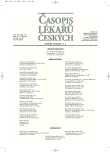Genotype – Disease Association and Possibility to Reveal Environmentally Modifiable Disease Causes: The Use of Mendelian Randomization Principle
Asociace genotypu s nemocí a odhalování jejich prostředím ovlivnitelných příčin: využití principu mendelovské randomizace
Přes významné zlepšování metodologie epidemiologických studií a analýz zdravotnických databází, zůstávají v observačních epidemiologických studiích asociace mezi ovlivnitelnými expozicemi a nemocí do určité míry zkresleny. Princip mendelovské randomizace, tj. náhodné rozdělení rodičovských genů potomkům v meiose během formování gamet a při koncepci, představuje jednu z šancí metodologie hodnocení příčinné povahy některých zevních příčin nemocí. Při využití tohoto přístupu je zjištěná asociace mezi nemocí a studovaným genetickým polymorfizmem, který odráží biologickou spojitost mezi podezřelou expozicí a nemocí, obecně méně náchylná k fenoménu zavádění nebo k zpětnému zapříčinění, které může zkreslit interpretaci výsledků konvenčních pozorovacích studií. Autoři ilustrují explanační možnosti mendelovské randomizace na příkladech vztahů folát – homocystein – ICHS a izothiokyanát versus karcinom plic. I když využití principu mendelovské randomizace má svá omezení, poskytuje nové možnosti jak testovat příčinnou souvislost dějů a jasně ukazuje, jak prostředky vložené do projektu lidského genomu mohou přispět k poznání a potenciálním možnostem prevence nepříznivých účinků ovlivnitelných expozic na lidské zdraví.
Klíčová slova:
genetická epidemiologie, rizikové faktory, příčinnost, folát, metylen tetrahydrofolát reduktáza, homocystein, ischemická choroba srdeční, glutathion-S-transferáza, brukvovitá zelenina, izothiokyanát, karcinom plic.
Authors:
L. Novotný; V. Bencko
Authors‘ workplace:
Ústav hygieny a epidemiologie 1. LF UK a VFN, Praha
Published in:
Čas. Lék. čes. 2007; 146: 343-350
Category:
Review Article
Overview
Though the methodology and designs of epidemiological studies and analyses of medical databases have improved, associations between modifiable exposures and the disease in observational epidemiological studies remain partly biased. Mendelian randomization principle, which is the random distribution of parental genes to offspring in meiosis during gametogeneis and at conception, represents a chance for methodology of evaluation of the causal relations between the external cause and the disease. The use of this principle assumes the association between the disease and the genetic polymorphism which reflects the biological relation between the suspected exposure and the disease, and is generally less prone to the phenomenon of confounding and reverse causation that can impair the interpretation of results in conventional observational studies. Authors describe explanatory options of the Mendelian randomization principle using examples in folic acid – homocysteine – coronary heart disease, and isothiocyanate versus lung carcinoma. Though the use of Mendelian randomization principle has its limitations, it offers new possibilities to test causal relations and clearly shows that means invested into the Human genome project can contribute to the understanding and prevention of adverse effects of modifiable exposure to the human health.
Key words:
genetic epidemiology, risk factors, causality, folic acid, methylene tetrahydrofolate reductase, homocysteine, coronary heart disease, glutathione-S-transferase, brassica genus, isothiocyanate, lung carcinoma.
Labels
Addictology Allergology and clinical immunology Angiology Audiology Clinical biochemistry Dermatology & STDs Paediatric gastroenterology Paediatric surgery Paediatric cardiology Paediatric neurology Paediatric ENT Paediatric psychiatry Paediatric rheumatology Diabetology Pharmacy Vascular surgery Pain management Dental HygienistArticle was published in
Journal of Czech Physicians

- Possibilities of Using Metamizole in the Treatment of Acute Primary Headaches
- Metamizole at a Glance and in Practice – Effective Non-Opioid Analgesic for All Ages
- Advances in the Treatment of Myasthenia Gravis on the Horizon
- Metamizole vs. Tramadol in Postoperative Analgesia
- Spasmolytic Effect of Metamizole
-
All articles in this issue
- Decompressive Craniectomy in the Treatment of Posttraumatic Edema and the Contribution of new Diagnostic Methods
- Milestones of Cardiovascular Pharmacotherapy: II. Digitalis
- Perioperative Betablockade
- Adjuvant Chemotherapy in the Treatment of Non-small Cell Lung Cancer
- Phytosterols as a Functional Food
- Genotype – Disease Association and Possibility to Reveal Environmentally Modifiable Disease Causes: The Use of Mendelian Randomization Principle
- How to Continue in the Treatment of Tuberculosis in the Czech Republic?
- Factors Modulating Parameters of Cholesterol Homeostasis in the Metabolic Syndrome
- Relation Between Alcohol Intake and Some Metabolic and Cardiovascular Risk Factors in the Healthy Men
- Practical Aspects and Clinical Value of t(14;18) Monitoring in Peripheral Blood of the Follicular Lymphoma Patients
- Effect of Surgical Treatment of Atrial Fibrillation on the Attainment and Maintenance of Sinus Rhythm in Patients Undergoing Concomitant Cardiac Surgery – Short-term Results
- The Use of Thrombelastography in Evaluation of Coagulation in Females with Physiological or Pathological Gravidity
- The Use of Paracetamol in Children –Benefits and Risks
- Indication to Occlusion of Patent Foramen Ovale in Patient with Pulmonary Hypertension after a Cardioembolic Stroke
- Journal of Czech Physicians
- Journal archive
- Current issue
- About the journal
Most read in this issue
- Adjuvant Chemotherapy in the Treatment of Non-small Cell Lung Cancer
- Indication to Occlusion of Patent Foramen Ovale in Patient with Pulmonary Hypertension after a Cardioembolic Stroke
- Phytosterols as a Functional Food
- The Use of Paracetamol in Children –Benefits and Risks
